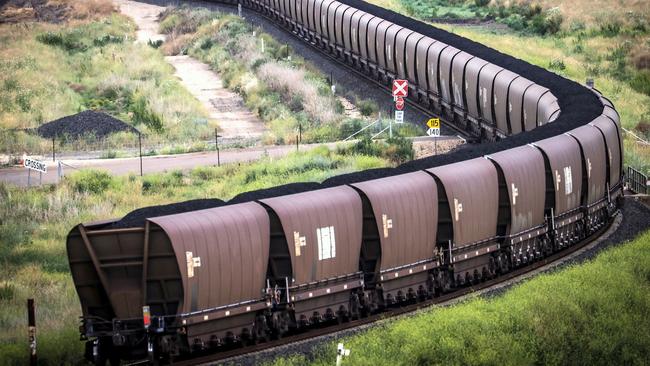The NSW government’s mismanagement of coal continues

The NSW government doesn’t like to acknowledge this and has constrained investment in coal and the supply chains that deliver this energy while quietly pocketing the windfall royalties they generate. Now, faced with the consequences of its own mismanagement – tighter supply and rising prices – it has hastily diverted coal bound for export markets.
This is a continuation of the chronic mismanagement that created the mess in the first place and, predictably, it will end up doing more harm than good. Revenues from coal exports will be eroded and our international reputation as a trusted energy exporter will be undermined further.
Meanwhile, we’re still not fixing the underlying problem: we are dismantling the architecture of our existing energy system before figuring out how to reliably replace the capacity it delivers.
For a government that has indulged rhetoric about the Elysian fields of a renewable economy lying just around the corner, it’s ironic the Treasurer’s emergency powers are being used to nationalise a component of domestic coal production.
How on Earth did we get here?
There are plenty of coal reserves in the state, just as there’s plenty of gas. But when the government sold off long-life state-owned generation assets with shorter-dated fuel supply contracts, it all but guaranteed they would be exposed to export prices one day. And so it has come to pass.
Around 80 per cent of NSW’s coal is exported. Domestic coal supply has tightened and prices have nudged higher as older mines contracted to supply power stations are exhausted, and not replaced.
Even still, coal is a relatively cheap fuel source and reliable as ever. The energy density of coal (and other fossil fuels) means that, absent nuclear energy, its replacement will take decades.

The world will consume more than eight billion tonnes of coal this year not because no one cares about climate change, but because the global economy demands vast and growing amounts of energy to power it. The correlation between abundant energy and prosperity is uncontested. There are no countries on Earth that are rich but don’t use much electricity.
Strong global demand for NSW coal just delivered an additional $2.1bn windfall from increased royalties, bringing forecast coal royalties to $6bn this year alone. That’s more than it’s costing to build Sydney’s second airport – in one year! Retaining export coal at regulated prices is the very definition of an opportunity cost.
The problem the NSW government is trying to fix is largely self-inflicted and its proposed remedy is confounding its own bureaucrats as they race the political clock to implement it. Worst of all, there is zero transparency about how the latest policy gyrations will deliver any real benefits for consumers over a meaningful period. But this is what happens when energy policy is informed by focus groups, not the physical realities of energy markets.
Energy is not just about climate change (in fact, abundant energy is essential to dealing effectively with climate change). Energy underpins the global economy and is critical to the security of all nations. Neglecting our coal industry materially impacts our most valued trading partners.
For the past century, withholding energy has been the action of despots or enemies, not trusted trading partners. Australia’s relationship with a rapidly developing Asia has been built on our ability to help power its growth. Many of our energy customers in Japan, South Korea and Taiwan pay a premium for the gold-standard energy security a country such as Australia used to be able to guarantee.
Australia is Japan’s biggest supplier of coal and gas. This is a trusted and vital strategic relationship. The newest, most efficient Japanese power stations are built to the specification of the highest-grade thermal coal supplied out of NSW’s Hunter Valley and Gunnedah Basin.
That trust is now being sorely tested. Last year Japanese Prime Minister Fumio Kishida made a pointed trip to meet Prime Minister Anthony Albanese to flag Japan’s concerns over rising energy nationalism in Australia.
Mr Kishida’s visit was in response to rising government intervention in Australia’s gas and coal markets, the introduction of price caps and attempts to reserve supply for domestic consumers.
It appears Mr Kishida’s concerns were well founded.
Keeping coal in Australia that was bound for our export partners in Japan, Korea and other Asian markets implies the needs of Australian consumers are greater than that of our Japanese partners who contracted the coal – a sentiment that might get some traction if we were energy-poor like Japan. The reality is we are one of the larger exporters of energy in the world and have vast, untapped reserves to call upon.
Our trade agreements with Japan are based on the principle that Japanese customers should be treated no less favourably than Australians, and vice versa. We would be outraged if the shoe were on the other foot.
Energy markets can be volatile, and are likely to become more so in a decarbonising world. The transition will be challenging and protracted but the long-term plan required to land the transition is not really in sync with short election cycles. The responsible thing for governments to do is to accept coal’s important and continuing role in global energy supply, and manage it accordingly.
Paul Flynn is CEO and managing director of Whitehaven Coal.


Contrary to populist political rhetoric, coal is still a pretty big deal in Australia. It’s our most valuable export commodity ($141bn, to be precise), it supplies two-thirds of east coast electricity, it delivers billions in state government royalties and it’s critical to helping power our largest Asian trading partners.